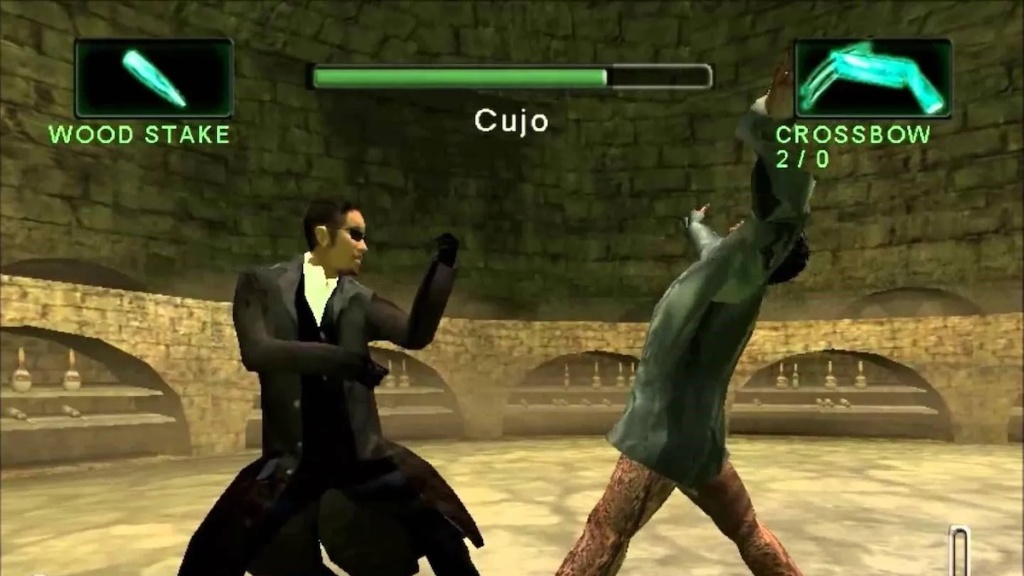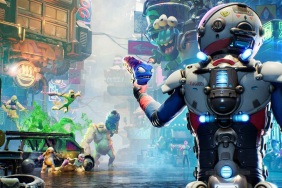It’s time to jack back in and re-experience the movie tie-in game that tried to be more than just a slick advertisement. There was a time when the attempt to secure a pipeline straight from blockbuster films to video game releases was huge, but few reached the ambitious level of Enter the Matrix. This simulation is far from perfect, but as Cypher so potently said, “Ignorance is bliss.”
It was the first game based on the iconic films, but that was only because a bad decision had been made. The Wachowskis knew they wanted a game for their visionary project set to release in 1999 and approached Shiny Entertainment, but founder David Perry believed The Matrix would be “another hacker flick.” Something that Perry would later tell Polygon was one of his worst career mistakes. Thankfully, the company would receive a second chance and another opportunity to play in this computerized world.
Instead of simply acting out scenes from The Matrix Reloaded in an overblown gamified form, there was an original story written by the Wachowskis, who were heavily involved in the development of games using their world. The creators were hands-on when it came to overseeing these types of projects and wanted those fans that were deep into their lore to not only see the film, but watch The Animatrix, read the comics, and play the game, all in an effort to get as many details about the story as they could. It was cross-promotional synergy at its finest, and The Matrix franchise may remain unbeaten in that regard.
Enter the Matrix put players in the role of two characters outside of the main action, but in an assignment that still felt vital to the heroes’ success. Selecting between Niobe (Jada Pinkett) or Ghost (Anthony Wong) offered a set of stages with different paths. The duo fights the same enemies, but in various parts, the details change, and selecting one over the other does determine whether the player handles more driving or shooting. Some fans were upset they didn’t get to play as Neo, but there’s something cool about being in on the ground level and seeing how other parties were helping behind the scenes.
There’s a large amount of live-action footage, and over an hour of it is new to the game, shot while they were working on the films and using a lot of the same actors and crew, which makes the game more enticing. With all of this being canon, however, it can make the story feel a tad more convoluted, and it definitely means new players need to have seen the movies to truly benefit from the plot. Everyone is welcome to enter The Matrix, but for diehard fans, the game does add some important story additions worth noting.
This is a game that got a little wild, in a good way, loosening the belt from the movies and allowing players to explore some of the dirtier work from what they had previously seen. The second film saw a good bit of the ghost twins, while the game allowed fans to play with the vampires and werewolves more, as well as explore action sequences that Reloaded didn’t take the time to show.
Enter the Matrix tried to raise the bar for movie games
Enter the Matrix was trying to start a trend, set a new bar for where movies and video games could be married, at least within the realms of character, story, and experience. Players use martial arts, guns, and the Focus ability to slow down time and watch bullets fly by, all while dressed in fashionable hacker attire. The world mimics the movies while Agents feel like a real threat (at first anyway), and the drive to see more of the story and cutscenes moves us forward. The most memorable feature though may be the hacking-based cheat system, where users can access the mostly-forgotten multiplayer and utilize DOS commands for various effects.
No matter what stuck out the most, the game was incredibly welcomed upon release, selling quite well and making way for another installment later on. Enter the Matrix would be rereleased as a budget title, and some versions were even slightly revamped with new mini-games. Each version of the game had issues and interesting bugs, but none of the releases escaped without some form of performance problem. For most, however, the PS2 offering seemed to provide the best overall experience.
As enjoyable and creative as Enter the Matrix was, there were a lot of problems. The normal controls work fine and look solid in many instances, but they can be sluggish and attacks are not snappy when dealing with multiple opponents, which is made worse by generally horrible AI, causing the enemies to either be too easy to defeat or ridiculous to hit. Driving and on-rail shootings sections can be frustrating and feel tacked on while melee encounters are lacking and level design comes across as uninspired other than looking the part. It does offer various modes in the gameplay, which required multiple engines, and this is one case where a more streamlined experience was most likely needed. Even Perry said the team, “bit off a little more than we could chew,” and in some cases were developing for platforms they weren’t exactly familiar with.
Though the game apparently spent over two years in development, the release date was set in stone to coincide with the film. Enter the Matrix had positives for sure, where the whole package still managed to come together even if several aspects fall short, but a lot of those successes hinged on the IP it represented, and this batch of code could have used some more time in production. Lead Programmer for the game, Michael “Saxs” Persson, said to Polygon, “No matter who you ask, Enter the Matrix was like Dante’s seven levels of Hell,” which seems a little harsh, but it sounds like this wasn’t an easy production period, no matter how much enjoyment players may have gotten out of it.
Some critics felt that the game cheapened the movie, but I don’t see that at all. In fact, Enter the Matrix may have suffered slightly for having to make the story fit in with the movies when that was the strongest aspect of the whole package. The game isn’t quite equal in its parts, some elements are epic, others are awkward, but its strength lies in what it was, an ambitious program that sought to give major fans another chance to enter the simulation.








